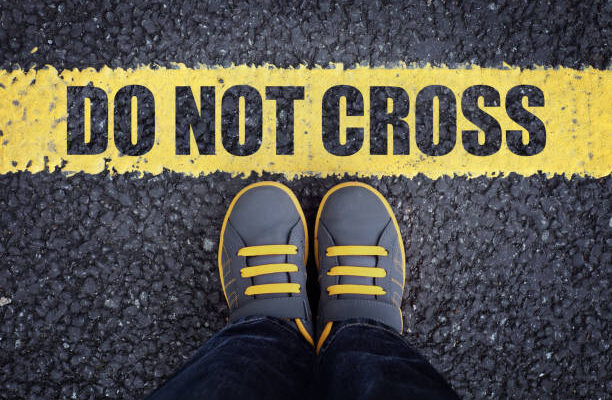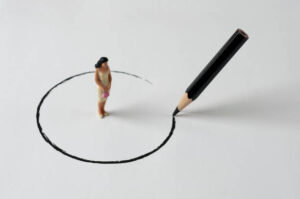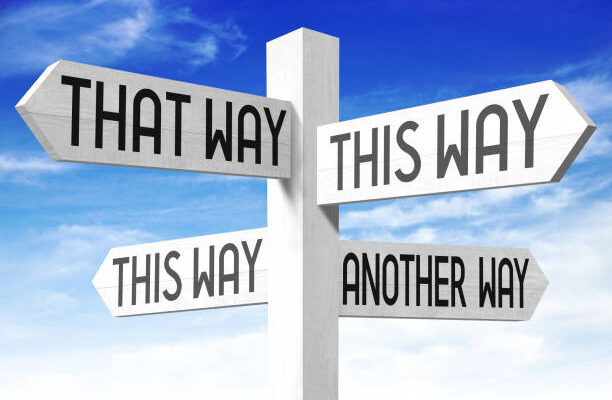Do You Feel Guilty When You Set Boundaries?

DO YOU FEEL GUILTY WHEN YOU SET BOUNDARIES?
Have you ever said No to someone doing something that makes you uncomfortable, and you feel bad for saying No? It is clear that this person is taking advantage of you, doing something displeasing, but you still feel bad putting your foot down and letting them know your feelings about that situation. If you’ve gone through this, don’t stop here, you will discover a few things.
BOUNDARY
It is a line that marks the limit of a specific area or thing. In behavioral psychology, a boundary is a limit to which a behavior/habit is acceptable to a person. They ensure that you live peaceably with yourself and those around you. A boundary serves the greater good in the long haul.
HEALTHY BOUNDARIES
Healthy boundaries not only assist you but others too. They should be set as a cautionary measure to stop impeding danger/conflict. You can also create them as a consequence of the same.
Let’s dig into some examples of boundaries within your environment.

Getty Images
- Security locks on your door – Marks your home boundary such that anyone that breaks in (without your consent) is eligible for prosecution/punishment.
- The laws of the land – Outline what is acceptable and unacceptable in our society.
- Road markings
- Rules and regulations in institutions, games, etc.
- Roles of Employees and Employers in Organizations
- Limits of interaction between people
- Personal space
- Prescriptions on medication
The list is endless.

Istock photos
The focus here will be on personal boundaries that you can categorize into:
- Physical (limits that ensure that you are physically safe)
- Mental/Psychological (restriction to make sure you are well mentally)
- Emotional (limit to ensure your emotional well-being is secured)
- Spiritual (limits to make sure that you are spiritually healthy)
- Sexual (restrictions to make sure that you don’t jeopardize your sexual well-being)
- Wealth (limits that ensure the security of your finances, time, and energy)
As you can see, boundaries are good. Without these confines, endless wars, conflicts, confusion, sadness, hatred, strife, crime, isolation, and other social and economic ills will be part of society.
IMPORTANCE OF BOUNDARIES

Image: Istock
Who do you think boundaries are for? The limitations you set are your responsibility since the primary function is to serve you, and the secondary one is to benefit others. Your objective assessment of a situation or potential occurrence/event is the basis for setting healthy boundaries.
The primary purpose of a boundary is not for others, and if that were the case, then you would be making it only when necessary (which may be late) as opposed to as a cautionary measure.
- To stop impending danger – Reflect on this, do you lock your front doors when the thieves arrive? Would that be late?
- Form of self-care – Setting boundaries establishes that you live a comfortable life with harmony within yourself. Knowing your limits and communicating with others lovingly and respectfully gives you peace. It is one of the simplest methods of caring for yourself, ensuring that your personal space is well guarded, and this even allows you to give more genuine care to others.
- To break cycles/patterns – You may experience cycles of hurt, break-up, and make-up cycles, multi-generational patterns, and self-sabotaging tendencies (addiction, procrastination, shifting blame, poor management of time, etc.) that you need to break. Owing to that, setting boundaries that you follow, and allowing others to keep you accountable frees you.
- Maintains healthy relationships – Different relationships come with different expectations. Relationships without boundaries bring confusion to the related parties. For instance, you must navigate your work relationships by the principles of the organization to ensure that you achieve your set goals.
- Gives clarity – Personal boundaries clearly show where you are heading. Your goals, aspirations, plans, and dreams all depend on the limits you set for yourself. You must impose limitations on your diet, sleep, and physical activity if you want to lose weight. These provide a solid foundation for the goals you have.
If you have no boundaries in those three things, then your path toward weight loss will be unclear, and as blurry as that becomes, the goal becomes unachievable.
6. Gives you the mandate to take action – Violation of clearly communicated boundaries like personal space, sexual intimacy, and physical abuse gives you the right to take the necessary action as per the limitations set to ensure that other people uphold them.
WHY THE BOUNDARIES THAT YOU SET ARE NOT WORKING

Source: Getty Images
- Setting boundaries with intense emotions/impulses
Objective evaluation is the key to setting clear boundaries. A calm mind settled emotions, and impulses allow you to weigh the options before making a semi-permanent choice.
Unless it is of immediate harm to you, you must carefully evaluate your confines and why you need them and weigh the pros and cons of creating them. Restrictions set after deep thought and reflection stand firm unless there is a change in the concerns brought forward.
When you set boundaries during intense emotions like anger, pain, and joy, you may change them when your emotions settle. During such instances, you may have clouded decision-making ability.
- You have no respect for them.
Do you start something but don’t finish them? You must follow through on any plans you make if you want them to be successful. If you state that you dislike it when someone is late, ensure you arrive on time. The best way to ensure others follow you is to lead by example.
- You don’t respect other people’s limits.
Do you take it positively and respect other people’s boundaries? Just as others need to listen to you and honor your confines. Please do the same. A spiritual law emphasized in religion is loving your neighbor as you do yourself. Therefore, do unto others what you want others to do to you.
- Setting boundaries without clear communication
I once heard a saying, ‘You cannot be angry at someone for breaking a boundary you didn’t set.’ Do you agree with it? Let me know in the comments. Setting boundaries is one part, and communicating clearly so that the other party knows the confines within which to operate is another part.
Communicated boundaries have clear consequences when broken and give the freedom to choose what is right. If you don’t convey that clearly, the odds are stacked against the other party already, and that is unfair to them.
WHERE THE GUILT COMES FROM

Image: Istock photos
Unfortunately, few people may like or understand your boundaries. As much as they are for the greater good, they may not make others happy. Some people may misconstrue them as selfishness, rebellion, pride, or other negative things.
You can feel bad, guilty, ashamed, or unfair for setting them. Some people, especially those that want you to do things the way they want, will not be happy when you set boundaries. Therefore, remember the primary purpose of putting the constraints.
Ask yourself why you set them, and remember that these limits serve as the bedrock/foundation for a healthy and peaceful relationship with others. When you keep, respect, and convey the information clearly, you set an example for others to emulate. Remember that you wouldn’t want to jeopardize the safety of someone that means a lot to you, even if it means you are a barrier to their well-being.
- People-pleasing tendencies stem from low self-esteem and can also contribute to guilt. To hold the fort against other people’s desires can be uncomfortable. When you thrive on external validation, setting boundaries for your good may be difficult. Working on that through psychotherapy, visiting your childhood wounds, and self-awareness enables you to deal with the guilt at its root.
- You feel guilty because you may have set them for the wrong reasons, like anger or a clouded judgment. When that happens, as emotions settle, guilt can follow. That is why it is paramount that you are objective when doing that.
- When you create them to punish others – You create limits to punish others for having their confines. It is possible to use that limit to revenge/ twist someone else’s arm because you are hurt (check out my previous article on games people play), where you do tit-for-tat games.
Your spouse may set a boundary you are not happy with, so in return, you deny them something you know they value, telling yourself that you are creating personal confines while, in the real sense, you are punishing them. When you base on this kind of foundation, they leave you with regrets because they work short term. An example is giving ultimatums, which is manipulative.
THEN WHAT?

Getty Images
Assertiveness is crucial in boundary setting and follow-through. You can learn unassertive behavior through negative reinforcement or punishment. (Salter, 2002, Wolpe, 1990). If you experienced punishment or criticism for being assertive, you could shy away from setting boundaries for fear of unpleasant consequences.
As I’ve always said, mental health is a journey, self-care is a journey, and you don’t have to do this alone. When you deal with issues of where things stem from, you allow yourself to heal, increase your assertiveness and self-esteem and reduce the things that deter you from making healthy choices.
You got this. You can overcome the odds. Help is on the way.
Writer,
Sheila K. Muli
Email: toolwellnesshub@gmail.com











A very educative blogpost. I appreciate how detailed it is on why the guilt after setting boundaries. Keep up! 💯 Already looking forward to the next post.
At times it is natural to experience negative feelings when creating confines but you can navigate them when you are doing it right. Thank you. Watch out for more articles coming up.
A nice piece on a very critical subject. Boundaries are critical for any healthy relationship.
Yes, they are. They serve to help give the best version of yourselves within the said relationship.
This is amazing. I knew about boundaries but your post has expanded even more in the importance of setting them for the right reason and on the right mindset. Thank you so much.
You are welcome. Setting boundaries with the right mindset does much more than doing so with no real basis.
[…] on chronic stress. They include physical exercise, games, recreation, facing the issues head-on, setting and communicating boundaries, and mindful exercises like breathing […]
[…] boundary is where you say that if you break ABC, here are the consequences. They protect you and others […]
[…] where you draw the line between helping others and doing someone’s work and later feeling used, frustrated, and […]
[…] sorrow that comes from doing the wrong thing or not doing the right thing. At times, you even feel guilty when you take care of yourself in terms of setting […]